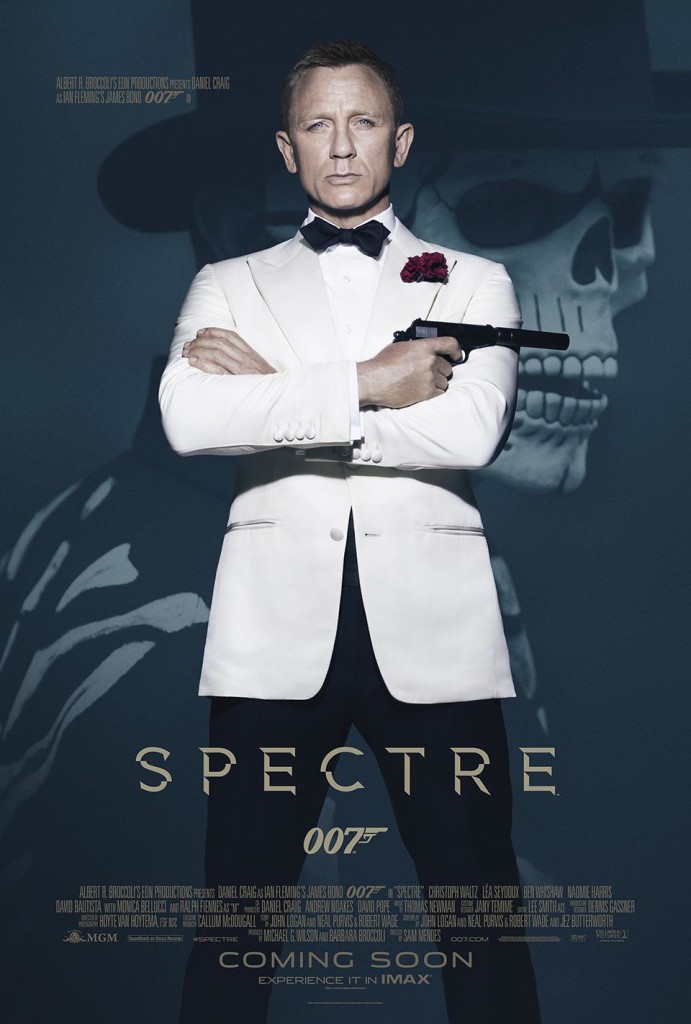Can the latest James Bond script win over a skeptical reviewer? Or will it be a spectretacular disaster?
Genre: Action
Premise: Bond goes off on a personal mission to find an elusive character known as The Pale King, only to stumble upon a secret organization known as “Spectre.”
About: What a strange place the Bond franchise finds itself in. It is healthier than Uber’s stock price, making billions of dollars every time it hits the streets, yet the debate over whether its current star, Daniel Craig, is a worthy James Bond or not seems as heated as ever. And let’s not forget that Craig regularly takes pot-shots at the franchise, the only films, mind you, that anyone seems to care about him in. Despite this, less than a month ago, he stated he’d rather kill himself than do another Bond film (although some people have implied this is a negotiating tactic). Then there’s this strange underground movement to make the next James Bond black. If he’s black, great, if he’s not, great too. I don’t know why we HAVE to have a black James Bond though. Why can’t he be Native American? Point being, there’s always so much drama over this character. It’s bizarre. Spectre is written by John Logan, who burst onto the scene in 1999 with his spec script, Any Given Sunday. It’s been rewritten by longtime Bond collaborators Neal Purvis & Robert Wade. And when I say “longtime,” I mean “longtime.” These guys go all the way back to Tomorrow Never Dies, which I’m pretty sure starred Roger Moore. Spectre comes out in early Novemeber!
Writers: John Logan (revised by Neal Purvis & Robert Wade)
Details: October 17, 2014 – 129 pages – shooting script
I usually start a Bond review with my typical Bond spiel, about how I don’t quite get the franchise, about how I loved the opening sequences as a kid, about how I always got a kick out of the villains, but other than that, the movies always seemed like an excuse for set pieces, extravagant locations, and giant spectacle to me. And while I suppose you can make that argument for any Hollywood movie, the reason Bond bothers me so much is because it’s always had the potential to be so much more. And yet it seems content with being just enough.
It appears they’ve tried to repair this in the Daniel Craig years, yet I’m not sure they have. The character is more debonair. The mood is weightier. The cinematography is slicker. But the scripts still feel like a patchwork of transitions to get us from one extravagant locale to the next. I wish they would approach Bond from a “story-first” perspective so we could get something that we’d enjoy in multiple viewings, and not just on the buzz-heavy opening weekend. I’m not holding my breath, seeing as they’re going with the same old writers again. But a man can dream, can’t he?
Spectre starts out in Mexico during the “Day of the Dead,” which as you’ve likely seen in the promotional material is that thing where everybody dresses up like a spooky skeleton, including, in this case, James Bond himself.
Bond is going after some guy that “M” (killed in the last film) told Bond he must kill via a post-mortem video message. Even in death, M’s still giving orders. So after knocking down a few martinis, as well as a few buildings (no seriously, Bond knocks down a few buildings), Bond kills this guy, and subsequently learns about an elusive figure known as, “The Pale King.”
Back at home base, Bond’s agency, MI-6, is combining with agency, MI-5, and the new dual-agency director, “C,” wants to make MI-11 surveillance-postiive. He’s got cameras in every nook and cranny of the building. His mantra is, “What does anybody have to hide?” Uhh, it’s an agency of SPIES! So I’m thinking, a lot.
Bond doesn’t like C, C doesn’t like D, and EFGHILMNOP. Bond’s got his own alphabet to worry about anyway. He heads to Rome to find out more about this Pale King fellow, and runs into the Mexico Guy’s wife that he killed. He quickly beds her (no seriously, he uses the line, “I killed your husband,” and three minutes later they’re making out. I wish I was James Bond. Sigh.), and learns that the key to finding The Pale King is talking to Bond’s old nemesis, Mr. White. Mr. White. Pale King. No wonder they don’t want a black James Bond!
In classic Bond fashion, it starts to become unclear what’s going on after page 70. Bond, for whatever reason, ditches his pursuit of The Pale King and instead heads off to find Mr. White’s hot daughter, Madeline (hanging out in the beautiful snow-tipped alps of Austria, of course). Madeline, who has a really bad daddy complex, starts taking out (and making out) her frustrations on Bond.
The two go on a quest to find something Mr. White was hiding. I don’t know why everybody in this world feels the need to give Bond a mysterious adventure to go on instead of just, you know, TELLING HIM WHAT TO GET. So instead of saying, “Here’s what you need,” they say, “Locate L’American. It is there where you will find your answers.”
Uhhh, okay. But wouldn’t it just be easier if you told me the answer in the first place?
Meanwhile, back at MI-11, C has used his new surveillance technology to snoop on Bond’s rogue mission. He wants to stop him, but instead gets distracted by his current obsession, a super-agency that links up the 9 biggest agencies in the world. If these then join MI-11, we’d have MI-20. And that’s an equation I don’t even think Will Hunting could solve. How do you like them apples? There’s something about using this new cross-agency-surveillance to defeat terrorism, but as you might guess, it’s the agency itself that becomes the terrorist. Or maybe not. Or maybe.
Okay so now that we’ve established how I think all James Bond movies are the same, let’s talk about the one thing that makes them different. Because the truth is, the makers of this franchise know they’re giving you the same meal over and over again. So they need one fresh ingredient, one unique attribute that allows them to say, “Something here is not like the others.”
Any ideas on what that might be?
It’s theme. Each James Bond film comes with a new theme to explore. And the trick they use to find their theme is simple. It’s one you can use yourself for your own screenplays. Identify a current issue in the world. That’s right. The Bond writers find the most pressing issue we’re dealing with every three years and build their movie around that.
So what’s this movie’s theme? It’s surveillance. We are all being watched. Everyone. And we know we’re being watched. James Bond is trying to appeal to as big of an audience as possible, so they choose as big and current of a theme as possible.
Now you may be saying, “Hey, that doesn’t sound so hard. I can do that.” But before you head over to Final Draft, I want to teach you a lesson about integrating theme, and it’s a lesson I’ve learned only recently. Ready? Grand generalizations about whatever theme you’re pushing are worthless. If James Bond drives past a random protest where people are saying, “We don’t like being watched!” it doesn’t push the theme of surveillance in a way that affects the audience.
The only way a theme resonates is if you incorporate it into the plot in a way that directly affects the main character. Then, and only then, do we feel your theme. Spectre does this numerous times but the most obvious example is that MI-6 (Bond’s agency) is combining with MI-5, and the new combined agency director, “C,” incorporates surveillance into the fabric of the agency. Bond can barely walk anywhere in the agency, do anything, talk to anyone, without a camera staring at him. So he is being DIRECTLY AFFECTED by the theme. That’s how you pull theme off, folks.
As for the rest of the script, I can’t say I loved it. The Bond scripts always seem to have this dry rhythm to them that follows the same pattern. Bond is told of a person or thing, so he must go to another country to find said person or thing. He goes there and finds the person or thing, only to be told that he actually needs to find something else in another country. So he goes to this other country where he finds his “something else” only to be told that there is someone who can answer his questions in another country. So he goes to this other country to find this person…etc…etc.
There isn’t a whole lot of skill in that other than coming up with cool-sounding names for what Bond must find (The Pale King, Mr. White, L’American, Spectre). You may as well call these things “A, B, C, and D” though. That’s how basic this practice is. It’s this very transparency that keeps me from warming up to these films.
I suppose it can be argued that the typical audience member is too caught up in the fun locations and set pieces to notice or care about this. Joe Moviegoer has a much higher tolerance for artificiality than Jack Hollywood. I get that. But after seeing the awesome “Martian,” and watching how they mixed that story up and kept you guessing, it reminded me of what’s possible. This mechanically written script reminded me of what happens when you follow the most basic boring plotting practice available to screenwriters:
Hero finds A, is told he must find B
Hero finds B, is told he must find C
Hero finds C, is told he must find D
Hero finds D, is told he must find E.
I really struggle with why people love these films so much. They seem so boring and obvious to me. Is it the wish-fulfillment factor? That Bond is like a God and we all want to be like him? I can’t even get on board with that, as I find him kind of cheesy. In an industry where we have multiple action-franchises doing the global fox-trot (Fast and Furious, Mission Impossible, Bourne), are even the locales that much of a drawing point anymore? What separates this franchise? What makes it unique anymore? Help me out here!
[ ] what the hell did I just read?
[x] wasn’t for me
[ ] worth the read
[ ] impressive
[ ] genius
What I learned: There are two ways to introduce theme into your story – direct and indirect. Indirect would be something that occurs in the background and doesn’t affect your hero. So if my theme was about how one-percenters ruled the world and the rest of the 99 percent were fucked, an indirect treatment of that theme may be to show a line of random poor people around the block at the local unemployment office. This conveys my theme, but it does so indirectly, as I the audience member don’t know any of these people. A direct treatment of that same theme would be to have my main character be one of the people in line. You are now expressing your theme DIRECTLY through your main character, who we can see is poor and needs assistance. Put a premium on direct theme. That’s where it will resonate the most.




